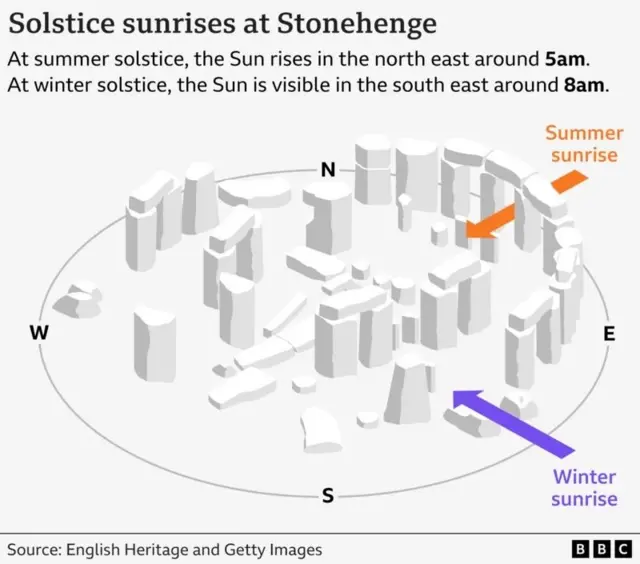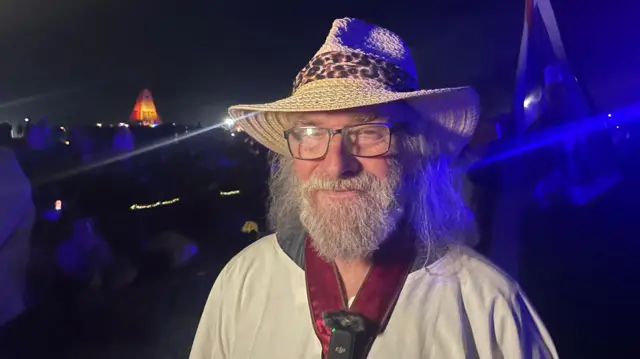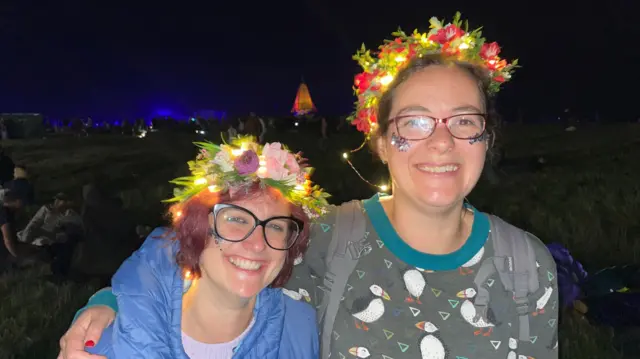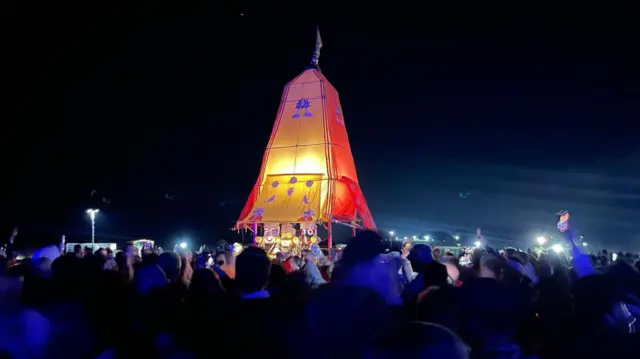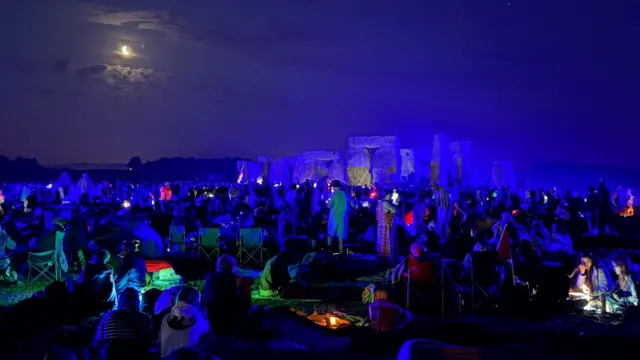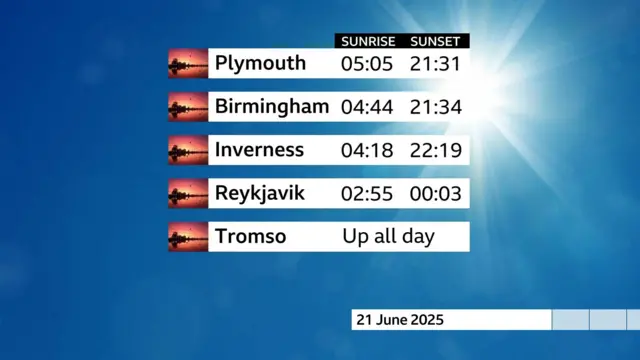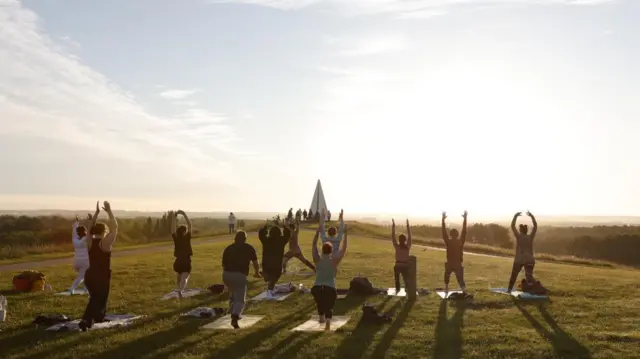Stonehenge in Wiltshire has been an important landmark for thousands of years and has become a focal point for both summer and winter solstices each year.
The stones are believed to have been moved there at about 2500 BC and are deliberately placed to line up with the Sun’s movement during the two solstices.
No-one really knows why Stonehenge was built, but its connection with the Sun’s movement and burials uncovered at the site mean it’s believed to have played a spiritual role.
The changing seasons would’ve meant a lot to the people who lived at the time, defining what would grow and the general living conditions, according to English Heritage’s website.
The history charity adds that “we can imagine that people came here [to Stonehenge] to celebrate midsummer and midwinter”, with its design suggesting that winter solstice – rather than summer – may have been the most important focus for the people who built the stone circle.
“We have few clues as to what they did here,” it says, adding excavations show the area within the circle seems to have been kept clean of everyday debris.
The Earth doesn’t spin on a vertical axis – it’s tilted, meaning the amount of sunlight reaching different parts of the planet changes during the year as the Earth orbits the Sun.
On the summer solstice, the northern hemisphere is most tilted towards the Sun – but it’s the opposite for the southern hemisphere today, which is tilted the furthest away from it and is experiencing its winter solstice.
The summer solstice always happens between 20 and 22 June but it’s not pinned down to be the same date each year.
This is because the calendar year doesn’t exactly match the time it takes for Earth to orbit the Sun – it’s about a quarter of a day short, which is why we have leap years to bring it back in line with the planet’s orbit.

Digital Editor, BBC West
The moment of the summer solstice – the point where the northern hemisphere of the planet is most tilted towards the sun – is about to happen.
It will occur at 03.42 BST and will mark the official start of summer, for astronomers at least.
For meteorologists the start of summer is a different date. Check out Darren Bett’s explanation here.
Now we are looking forward to the first sunrise after the solstice in the UK, in just over an hour’s time.
The summer solstice marks the 24-hour period with the most hours of sunlight, which people often call the “longest day of the year”.
It always occurs between 20 and 22 June and the tilt of the Earth determines how long you can expect to have sunlight – the further north you are, the longer you can expect to see the sun’s rays today.
The Earth spins at a tilt and for half of the year, the northern half of the planet is tilted towards the Sun – which is the position the Earth is when it’s the summer solstice.
From today onwards, the days will gradually get shorter until the winter solstice on 21 December.
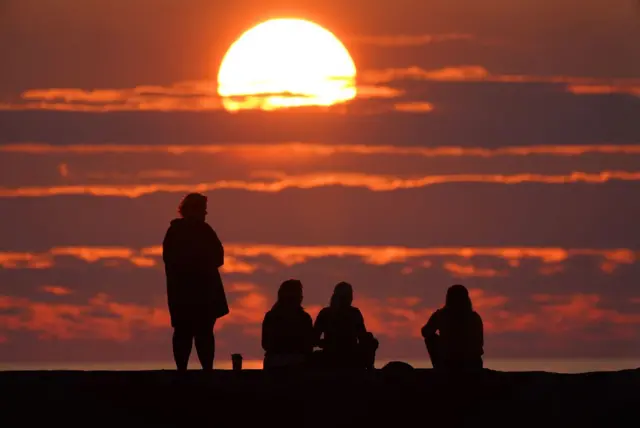

BBC News, Live page reporter
Rollo Maughfling, the Archdruid of Stonehenge and Britain, told our reporters Emma Colman and Emma Elgee that he has been coming to the solstice at Stonehenge for the past 37 years.
In his role, he says he is responsible for arranging the rights and access for people who want to participate.
He said how busy the site is this year was “daunting at first”.
“It look a long time for people to get in,” he said. “They were baking in the sun for an hour or two before they could get in.
“Once everybody got in and it cooled down then it’s become really very pleasant.”
“I think it’s great really,” he added. “I think it’s what these ancient places were built for, so people can come together and have gatherings.”
It will be sunrise at 04:51 BST at Stonehenge in Wiltshire, where thousands of people have gathered.
Our reporters Emma Elgee, Emma Colman and Chris Keen are there to bring you a flavour of celebrations from the ancient stone circle.
But Stonehenge isn’t the only stone circle in Wiltshire. At one of the others, Avebury, we have Sophie Parker and Adam Clerck.
And Liam McGuinn and Simon Lewis will soon be making the climb up Glastonbury Tor for solstice celebrations there.
Meanwhile, Kate Clark will join people heading to Cheltenham Lido for a sunrise dip.
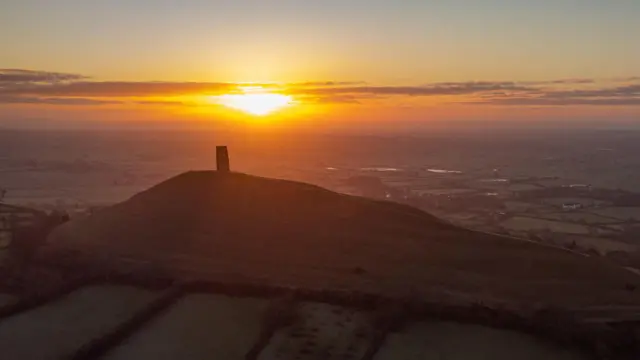

BBC News, Live page reporter
Back in Wiltshire, people have travelled from far and wide to experience the summer solstice at Stonehenge.
Anneka Watson, 38, told our reporter Emma Elgee she left her home in Edinburgh at 04:00 BST on Friday to get to Stonehenge for the solstice.
“I’ve never been to Stonehenge or Wiltshire before,” she said.
“We’ve talked about doing it for years and we finally got round to doing it this year.”
“It’s amazing,” she added.

Digital Editor, BBC West
There have already been celebrations for the solstices in other parts of the world.
At Long Beach in Hobart, Australia, nude swimmers enjoyed a dip to mark the winter solstice.
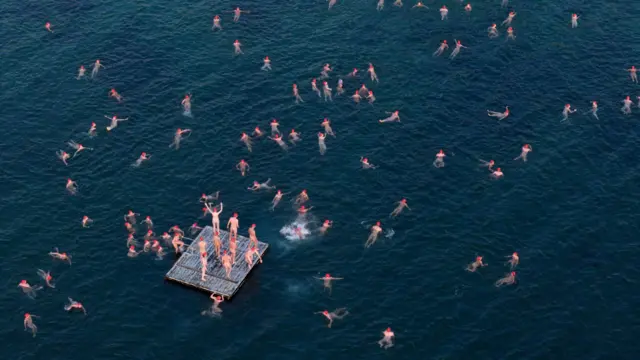
And people have been taking part in a Mind Over Madness Yoga event to celebrate the summer solstice in Times Square, New York.
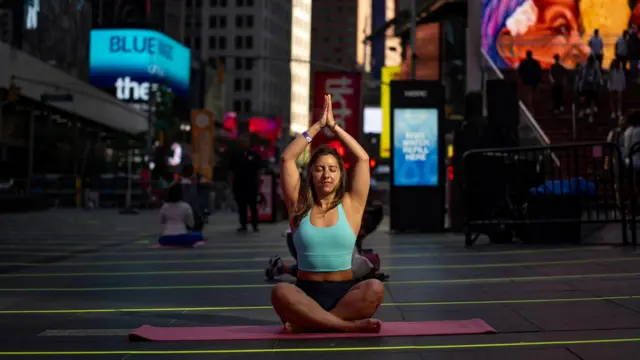

BBC News, Live page reporter
A large crowd has gathered at Stonehenge ahead of the summer solstice. The sun will rise there in just over an hour, at 04:51 BST.
Our reporters Emma Colman, Emma Elgee and Chris Keen are there soaking in the atmosphere.
They say there is relaxed feel, with thousands of people already on site.
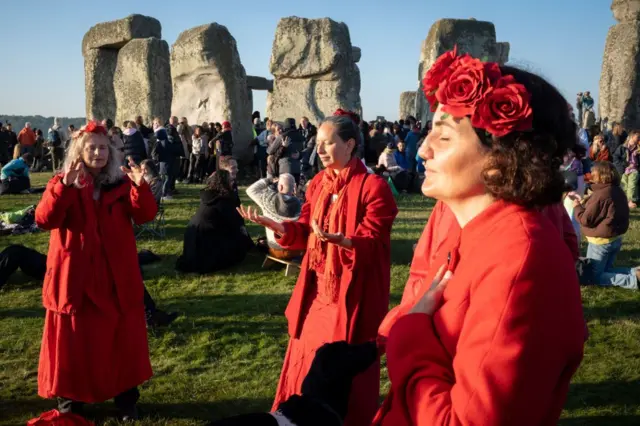
People descend on Stonehenge each year to celebrate the
summer solstice, so here’s a checklist of what you need to know if you’re
joining them at sunrise:
-
Parking
is very limited and visitors are advised to car share where possible, say
English Heritage, which manages the historic site – you
can find more about travel options on its website - Wear sensible footwear – you don’t want sore feet while waiting for the sunrise
-
People
are asked to not wear hi-vis jackets as it can cause confusion with safety
officials -
Big
umbrellas are not allowed but you can take a small one, so take a
waterproof coat or hat instead - Drones and remote-controlled flying devices are banned from the site, and amplified music and alcohol are not allowed at Stonehenge, in the surrounding landscape, or in the car park
- Don’t forget to take all of your rubbish with you when you leave
As you can see from our colleagues at BBC Weather, the amount of sunlight you’ll see today really is dependent on where you are.
The sun will rise in Inverness in the north of Scotland 47 minutes before it rises in Plymouth on England’s south west coast.
But the daylight goes on longer into the night north of the border as well, with the Scottish city getting 48 minutes more daylight at the end of the day than its English counterpart 641 miles (1,031km) south.
But neither place will get as much sunlight as Tromso, the world’s most northerly city, where the sun will be up all day.

BBC News, Live page reporter
The A303 has been closed in both directions near Stonehenge due to a high volume of vehicles parked on the side of the road and pedestrians on the carriageway.
Wiltshire Police said the road is closed between the A360 at Longbarrow Roundabout and Countess Roundabout, Amesbury.
“The closure will be kept under review,” it said.
Motorists are being told to use an alternative route via Countess Road and through Larkhill.
“We would like to remind motorists to drive safely and cautiously due to the increased risk of pedestrians walking in the road,” it added.
To answer this, let’s look at the two ways the start and end
of seasons are defined.
One is the astronomical seasons, which are based
on the position of the Earth in relation to the Sun. The astronomical summer is
often marked as beginning on the summer solstice.
The Met Office says this year, astronomers are marking
summer as starting today and ending on 22 September – but the dates shift
slightly each year.
Meteorological seasons are another way of
defining the start and end of seasons. They’re based on the annual temperature
cycle and are split into four quarters made up of three months each – a more
consistent way that makes it easier to compare seasonal statistics.
This means meteorologists always class the northern
hemisphere’s summer as being from 1 June to 31 August.
So, is today the start of summer? It depends on whether
you’re asking an astronomer or a meteorologist.
Good morning, and if you’re up in the middle of the night joining us, thank you, you have a very long day ahead – literally.
Today marks the summer solstice, the longest day and shortest night of the year, and as you read this thousands of people will be gathering at sites around the UK to mark the start of the astronomical summer.
We’re up nice and early (or very late, dependent on your view point) for you, with reporters at Stonehenge, the Avebury Stone Circle and Glastonbury Tor.
There’s a good chance if you are reading this in the middle of the night you’re struggling to sleep in the heat – and it’s expected to continue today, with temperatures of up to 34C and a yellow warning for thunderstorms.
